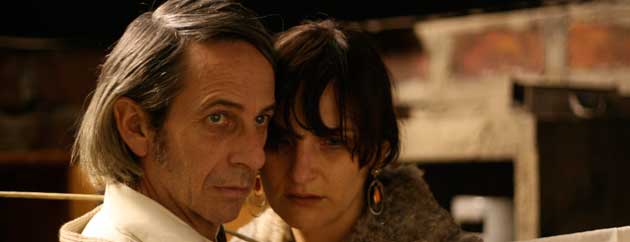
Post Mortem
26 September, 2011Pablo Larraín’s vision of Santiago, Chile in 1973 looks every bit as drab as Britain from the same time. The houses and people are adorned with the same beige and brown colours as you might expect from a British drama about industrial unrest: flared trousers, facial hair and dated grubby furniture. But the historical backdrop here is the lead up to the military coup of that year and the death of the democratically elected Marxist president, Salvador Allende.
“This woman was beaten to death. Poor old thing… Actually, Scratch that.”
Mario starts erasing. “No, don’t erase it, just scratch it. Ok then, erase. I don’t know how you read your handwriting when you get back home.”
Mario works in a morgue, taking notes of autopsy reports which he then types up at home with the help of a neighbour’s child. He is only barely competent at his job though, and has none of the enthusiasm which you might expect a passionate funeral director or embalmer to have for the respectful processing of a corpse. He is therefore a morgue worker who is even more strange and creepy than you might expect.
He is cold to the advances of one of his promiscuous female colleagues and keeps to himself when the rest of his team discuss politics over a meal. The only thing he shows any interest in is Nancy, a neighbour who works as a dancer, who he manages to chat to behind the scenes of the show for which she has just lost the leading part due to being “anorexically” thin.
Aside from boosting Nancy’s ego, Mario is also a companion who similarly doesn’t take that much of an interest in politics and is therefore a handy escape from her father and boyfriend who hold communist meetings in their house. When Mario first starts to drive her somewhere, their path is blocked by a communist rally; the demonstration has little to no relevance to the couple, it is merely an inconvenience which forces them to reassess their route.
Mario Cornejo is the name of an an actual person who was present at Salvador Allende’s autopsy and Larraín was inspired to make the film by a news story which mentioned him. Everything else is fiction, or at least only speculative as few details are known about him, only that he was present at a very significant moment in Chile’s history. This use of layman’s perspectives to deal with big events is something which George Lucas tried to do with Star Wars after he had watched Akira Kurosawa’s The Hidden Fortress, where two bumbling thieves become accidentally caught up in the dealings of generals and princesses.
The blurb for Post Mortem makes the leap that Mario’s attempt to gain the affections of an unattainable woman is a symbol for the beautiful but impossible ideal of socialism. I would not go so far as this, but rather point to the themes of detachment or involvement with politics. Despite managing to base some kind of relationship around avoiding the various strikes and protests going on around them, I think what Larraín has done well is to emphasise the ever present looming shadow of the Junta which eventually does make it impossible to completely withdraw from political events. Occasionally, Mario and Nancy succeed in getting away, but even before the coup drags everyone into its service they both share a long and unexplained weep, which I assume is bottled up fear and anxiety coming to the surface. And when the coup does happen, Nancy’s family are directly targeted and Mario must deal with ever mounting piles of bodies, and eventually with transcribing the coroner’s verdict of Salvador Allende’s cause of death: a bullet wound from “short distance.”
The way that historical events take a back seat until near the end of the film will mean that this is more likely to please fans of the dark and gloomy styles of Michael Haneke than those who want a shortcut to knowing more about Chile’s past, but since there is serious doubt and controversy about how exactly some of the events panned out, it is perhaps better to have an honest interpretation of what it might have been like to live in those times, and not an attempt at a docu-drama based on dodgy evidence. The motto of this film would then be something like the assertions of Mario’s boss during a particularly preachy session at a meal: “You cannot escape the wheel of history.”
Post Mortem is currently showing in some UK cinemas.
Follow Sounds and Colours: Facebook / Twitter / Instagram / Mixcloud / Soundcloud / Bandcamp
Subscribe to the Sounds and Colours Newsletter for regular updates, news and competitions bringing the best of Latin American culture direct to your Inbox.

